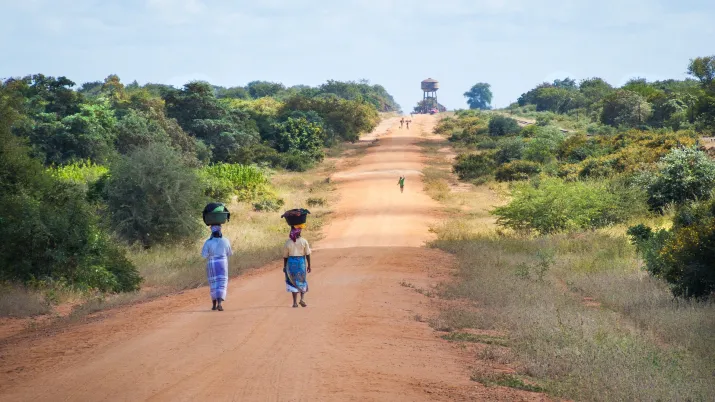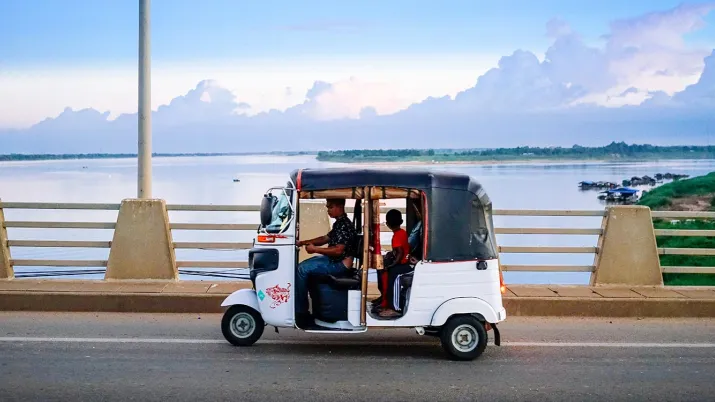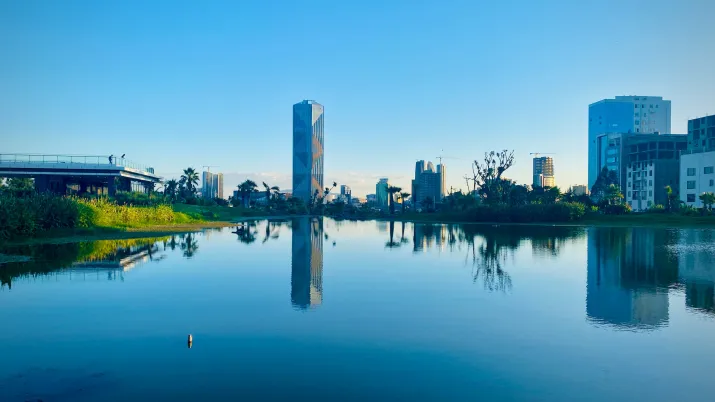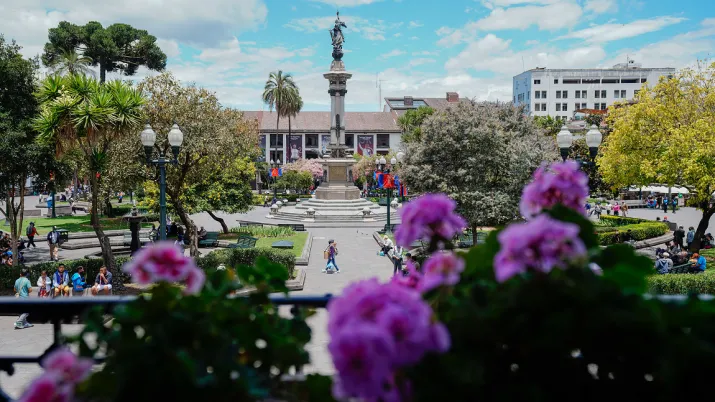 Within the framework of the ECOPRONAT research programme, AFD supports the development of methodologies to assess the environmental sustainability at the level of a territory - and more particularly in Colombia and South Africa -, using the ESGAP (Environmental Sustainability Gap) framework. This framework produces a synthetic indicator based on a dashboard to monitor the state of the environment from a strong sustainability perspective.
Within the framework of the ECOPRONAT research programme, AFD supports the development of methodologies to assess the environmental sustainability at the level of a territory - and more particularly in Colombia and South Africa -, using the ESGAP (Environmental Sustainability Gap) framework. This framework produces a synthetic indicator based on a dashboard to monitor the state of the environment from a strong sustainability perspective.
Context
Public actors need to monitor the state of the environment in order to assess the effectiveness of their actions, prioritize management policies and measures, and thus objectively establish their contribution to the conservation of natural capital. To do so, they must be able to rely on science-based standards to identify the thresholds at which environmental functions can be considered sustainable.
The ESGAP (Environmental Sustainability Gap) is an innovative tool for assessing the condition of a territory’s environmental functions and how sustainable they are. For all critical components of natural capital in the territory concerned (air or water quality, pollution, forest resources, fisheries, etc.), this indicator calculates the difference between their current state and a state that would be sustainable (i.e., a state compatible with the sustainable functioning of the processes necessary for the preservation of life, human activities and well-being). This allows for the calculation of the “environmental sustainability gap”, which highlights the path to environmental sustainability. This can then serve as a guide for public policies to estimate and preserve the critical functions of the natural capital of a given territory. ESGAP has already been tested in New Caledonia, Kenya and Vietnam.
Within the framework of the ECOPRONAT research programme, AFD aims to develop methodologies for assessing strong sustainability, that is, adopting demanding criteria concerning the non-substituability of natural capital by other forms of capital (physical among others) in a territory or country. AFD also wants to promote their use in international frameworks and contribute to emerging international standards on the good ecological state of ecosystems.
Find out more about ECOPRONAT
Objectives
Building on the previous work of University College London (UCL) on the application of ESGAP in countries of the Global South, this research project led by UCL aims to implement the ESGAP framework in Colombia and South Africa. It will test its relevance in fostering public policy dialogue in these two countries that already have a regulatory framework and natural resources management, but where not all data on biodiversity is available.
More specifically, this project has four objectives:
- Developing the ESGAP components related to biodiversity and the state of ecosystems that could be used by Colombian and South African governments, and promoting the use of science-based targets for ecosystem maintenance;
- Promoting reflection on strong sustainability in Colombia and South Africa through the ESGAP framework, by assessing whether the activities carried out in these countries are within the safe operating space for humanity;
- Clarifying how the ESGAP framework aligns, complements and adds value to other types of existing sustainability indicators that national governments are already using;
- Strengthening the capacity of partner countries to implement the ESGAP framework beyond this research project.
Method
The ESGAP framework is based on a dashboard that provides information on changes in the functional state of 23 components of the environment, focusing on the gaps that exist between these changes and the objectives of maintaining or achieving a "good environmental state". These components cover the 4 main categories of critical and essential environmental functions: resource provision, pollution reprocessing, biodiversity and human health. The scores for each of the twenty-three components are then aggregated to form a synthetic indicator and a dynamic indicator.
The research activities in the two pilot countries is carried out by researchers from Stellenbosch University (South Africa) and the National University of Colombia (UNAL). Capacity building will include training four postgraduate students as well as awareness-raising activities targeting policymakers and other stakeholders, in order for them to take ownership of the ESGAP and use it during public policy formulation.
Expected results
The research teams will produce scientific papers on the relationship between the ESGAP framework and other sustainability indicator initiatives, as well as on the work and calculations of the ESGAP indicators carried out in each country, comparing the cases of Colombia and South Africa. A specific report will be produced on indicators of the state of biodiversity and ecosystems as well as the identification of data sources for the two countries studied.
In addition, an international workshop will be organized to present the complementarities between the ESGAP framework and relevant initiatives of existing sustainability indicators.
Finally, the research team intends to produce several documents for decision-makers and public policy actors:
- A summary of the review of biodiversity indicators and the state of ecosystems, which may be useful for negotiations at the Conferences of the Parties (COPs) to the Convention on Biological Diversity and for the design of national biodiversity strategies and action plans (NBSAPs);
- A webinar with a webinar report on the relationship between the ESGAP framework and other international sustainability reporting initiatives;
- A summary for decision-makers in each partner country on the rationale of the strong sustainability development approach and the methodology and ESGAP indicators that enable it to be implemented.
Download the publications related to the project:
- The SDGs Provide Limited Evidence That Environmental Policies Are Delivering Multiple Ecological and Social Benefits, Earth's Future vol.12 (May 2024)
- Enhancing Environmental Sustainability Through the Environmental Sustainability Gap (ESGAP) Framework in Colombia, Policy Dialogues n°67, Editions Agence française de développement (October 2024)
- Strong sustainability in the SEEA and the wider indicator landscape, One Ecosystem (May 2025)
- Assessing environmental sustainability in Colombia: Metrics and policy recommendations, Environmental and Sustainability Indicators n°27 (September 2025)
A "Research Conversations" webinar presented the results of the articles to the scientific community in November 2024:
Contact
-
Oskar LECUYER
Research Officer, Environmental Economist
Discover other research projects
 As part of the ECOPRONAT research programme, AFD is working with the Indian Institute for Human Settlements (IIHS) to analyse the links between urban agriculture, nature-based solutions (NBS) and city-scale resilience in Bangalore. Documenting the role of urban food systems in the production of ecosystem services aims at contributing to the development of sustainable urban development policies.
As part of the ECOPRONAT research programme, AFD is working with the Indian Institute for Human Settlements (IIHS) to analyse the links between urban agriculture, nature-based solutions (NBS) and city-scale resilience in Bangalore. Documenting the role of urban food systems in the production of ecosystem services aims at contributing to the development of sustainable urban development policies.
Context
As the field of research on green infrastructure and nature-based solutions in cities expands, the potential of urban agriculture in the production of ecosystem services remains unexplored. Beyond the benefits of increasing food supply and reducing the vulnerability of urban populations, urban food systems can be at the heart of policies to develop nature-based solutions. This project studies the potential benefits of these systems in the perimeter of Bengaluru, an Indian city with a strong heritage in terms of urban agriculture.
This project is part of the ECOPRONAT research programme, which supports research on how to better take into account biodiversity and mainstream it into key economic sectors.
Objectives
Taking the case study of Bengaluru, this project led by IIHS explores how and why urban food systems, in rapidly developing urban and peri-urban areas, can be seen as nature-based urban solutions that bring benefits to ecosystems and society.
Two research questions are addressed:
- What is the scope and outcomes of urban agriculture for ecosystem services (including pollination) and societal well-being (such as food and nutritional security of the most vulnerable populations)?
- How can we use different co-production pathways across the science-policy-citizen interface to scale up NBS around sustainable urban agricultural practices?
Method
The research methodology is based on three main work packages:
- Synthesis of scientific knowledge on the potential of NBS and existing practices at various scales, and particularly within a chosen ward of Bengaluru with the deployment of pilot interventions;
- Incubation and capacity building: incubating novel NBS ideas and experiments related to pollinator friendly and water conserving urban agriculture, and capacity building through the training of various stakeholder groups;
- Scaling impact by identifying and engaging with different stakeholders, including city-level policy and decision makers, right from the start of the project to ensure the scaling of impact throughout the project.
Results
The expected results of these projects are:
- Academic results on sustainable urban food systems in the context of rapidly urbanizing countries from the Global South, on urban NBS experiences and their effects on ecosystem services (including pollination);
- Knowledge outputs for urban decision-makers on the integration of NBS in urban planning;
- Capacity building and teaching materials on multidisciplinary approaches to urban sustainability.
The project is also testing nature-based solutions aimed at strengthening the resilience of food systems in Bangalore.
An example: the PLUME project
Supported by the IIHS, the PLUME (Pollinator Linked Urban Multifunctional Ecosystems) project is developing pollinator-friendly food gardens in private and public spaces, installing infrastructure such as bee hotels, and raising public awareness of the importance of biodiversity for urban agriculture. The project team has designed a ‘PLUME toolkit’ containing seeds of local species and the appropriate equipment for sowing them, as well as educational tools and a website.
By testing nature-based solutions, PLUME is the action research component of the research carried out by the IIHS on the greening of urban food systems as part of the Ecopronat research programme. It demonstrates how sustainable agricultural practices can be integrated into cities while enhancing biodiversity and citizen involvement through a research-action approach.
Research findings
The research team aims to show how nature-based solutions (NbS) can address urban water security challenges in the Global South — a topic that remains underexplored in the scientific literature, which is still largely focused on the Global North. Drawing on expert discussions and a literature review, they identify the specific characteristics of these contexts (environmental, socio-economic, governance-related, technical capacity, etc.), as well as the barriers and opportunities for implementing these solutions. The goal is to propose concrete avenues to support the more effective and equitable adoption of NbS in cities of the Global South.
Read the research paper
Contact
-
Julien CALAS
Research Officer on Biodiversity
Other projects on Nature-based Solutions supported by ECOPRONAT
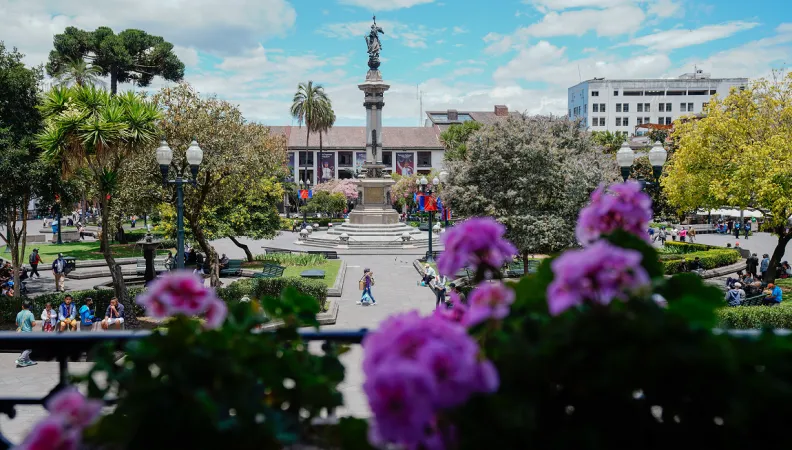 As part of the ENSLAC project, AFD is working with Yes Innovation and its partners to study and identify replicability levers for nature-based solutions in three South American countries – Ecuador, Colombia and Peru. Fifteen initiatives are analyzed in order to understand how natural ecosystems are mobilized in urban areas, what are their impacts and how nature-based solutions (NBS) could be more widely integrated into spatial and urban planning.
As part of the ENSLAC project, AFD is working with Yes Innovation and its partners to study and identify replicability levers for nature-based solutions in three South American countries – Ecuador, Colombia and Peru. Fifteen initiatives are analyzed in order to understand how natural ecosystems are mobilized in urban areas, what are their impacts and how nature-based solutions (NBS) could be more widely integrated into spatial and urban planning.
Context
Latin America is the second most urbanized region in the world, with 81% of its population concentrated there. This strong urbanization, its rapid growth and the weakness of urban planning policies affect areas of high ecological and environmental value. However, natural ecosystems can be a source of solutions for those involved in urban design and development, in particular to respond to the risks generated or exacerbated by climate change.
Understanding nature-based solutions (NBS), studying their implementation conditions and analyzing their integration into public policies is therefore necessary to ensure the livability of cities in the long term. While NBS and green infrastructure are still recent in the urban landscape, initiatives have been deployed for several years and are a privileged source of data to exploit.
This project is part of the ECOPRONAT research programme, which supports research on how to better take into account biodiversity and mainstream it into key economic sectors.
Objectives
The ENSLAC (Enabling Nature based solutions Scale-up in Latin American Cities) project aims to analyse the mechanisms that enable the scale-up of nature-based solutions implementation in Latin American cities, drawing on 15 case studies in Peru, Colombia and Ecuador. This research approach aims to:
- Analyze the challenges of ecological restoration for the management of risks related to the impacts of climate change in urban areas;
- Understand the levers for using NBS as a tool for urban planning and development;
- Identify the temporal, technical, cultural, political, social, financial and cooperative processes that have enabled large-scale NBS-based projects;
- Assess the influence of national or supranational strategies and policies on NBS development;
- Disseminate the knowledge produced by focusing on formats and channels that can be used for the training of urban development actors.
To explore these issues, Yes Innovation, based in Quito, works with the Humboldt Institute for Biological Resources Research, an institution linked to the Ministry of the Environment of Colombia, and Periferia Territorios Vivos, a Peruvian organization specialized in urban planning with an ecological approach.
Method
This research project uses two analytical tools (depending on the case study and the available field data):
- Temporal and spatial analysis (known as BA/CI, which refers to a Before/After and Conservation/Intervention analysis);
- Comparative analysis between case studies on NBS and reference cases of comparable characteristics but without implementation of NBS.
Results
The ENSLAC research project aims to:
- Understand mechanisms that enable scale-up of nature-based solutions as a tool for urban and peri-urban planning;
- Identify replicability levers of these NBS for Latin American cities;
- Produce training materials for urban development actors.
The research team presented its findings during a webinar from the Research Conversations series. The replay is available below (in French and Spanish).
Find out more
Contact
-
Julien CALAS
Research Officer on Biodiversity

